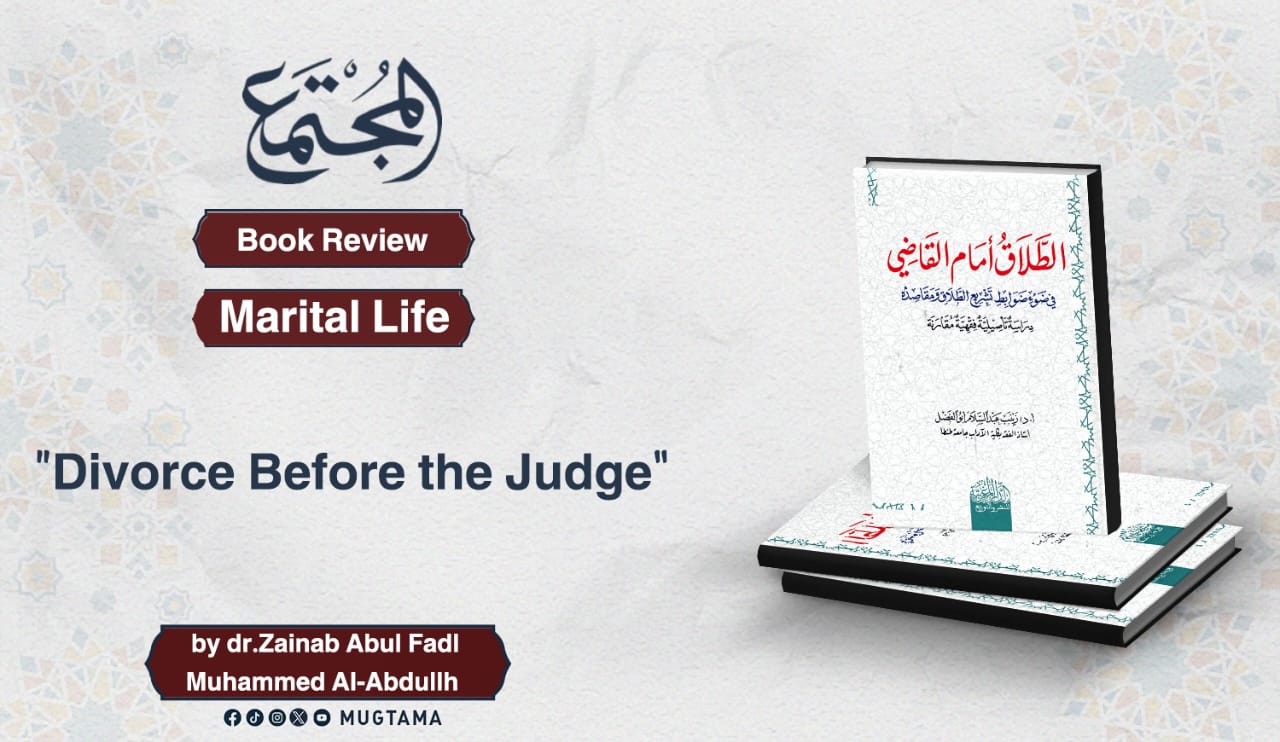Book Review: “Divorce Before the Judge” by Dr. Zainab Abul Fadl

Dr.
Zainab Abul Fadl is considered one of the few scholars of Islamic
jurisprudence who embody the spirit of maqasid al-Shariah (the higher
objectives of Islamic law) in her beneficial writings. Her works often address
religious issues and rulings in a manner that reflects the noble purposes of
Islamic law, supported by evidence and deep understanding. Among her writings
is her book “Divorce Before the Judge.”
She believes that there is no
doubt a major imbalance has afflicted the structure of the family in Arab
societies of all kinds.
Dr. Abul Fadl explains in her
book that this imbalance, according to statistics, is primarily due to the
widespread phenomenon of unjust divorce, which leads to the loss of rights and
the corruption of relationships.
This is also caused by both
parties, the wife and the husband, being keen on exacting revenge against the
other with all their might, often turning a blind eye to the consequences of
this on their children's present and future, as she asserts in the book.
The author also sees that the
woman, whether we like it or not, is the weaker party and an object in the
issue of divorce, especially in the way it is implemented in our societies,
which still function under the mentality that since divorce is a man’s right,
then he alone holds the power of decision in it.
Moreover, the book points to the
danger of some prevailing conceptions in this matter, such as the idea that no
one has the right to limit a man's authority in using this right, no matter how
much he abuses this right or acts unjustly.
The author warns that the danger
lies in the fact that it’s as if we are in pre-law societies, unfamiliar with
the legal theory of “abuse of rights,” and its legal and punitive
consequences. Rather, it is as though we live in pre-Islamic societies, even
though Islam firmly laid the foundation for this legal theory, one that is
supported by clear texts from the Qur’an and Sunnah, in public matters and
particularly in family affairs, whether regarding building (marriage) or
dissolution (divorce).
In discussing this issue, the
book emphasizes that the discourse of the Sharia is used as an objective, aimed
at preserving rights and preventing their loss. Therefore, any injustice that
befalls either party is considered a transgression, abuse, and oppression, and
goes against the intent of the Lawgiver in His legislation. In such cases, if
this injustice becomes widespread in society, it is then the duty of that
society to hold the transgressor, abuser, and oppressor accountable through the
authority of law. As the saying goes: “Indeed, Allah deters through
authority what He does not deter through the Qur’an.”
The book was written with the aim
of clarifying the true stance of Islamic Sharia on the issue of restricting the
husband's authority in issuing divorce. Can a law be enacted to prohibit a man
from issuing divorce except before a judge—for the sake of preserving rights
and preventing discord and injustice? And does this have a basis in Sharia or
not?
Key Topics of the
Book
1. Divorce is the
husband's right, but not absolute:
The Sharia affirms the man's right to divorce, but at the same time sets
regulations and objectives aimed at preserving rights and preventing harm to
women.
2. Abuse of rights:
The author relies on the principle of abuse of rights in Islamic Sharia, which
means that exercising a right in a way that harms others is considered
injustice. Therefore, arbitrary divorce is unacceptable.
3. The judiciary’s
role in protecting women:
She argues that requiring divorce to occur in court may serve as a means to
protect women from arbitrary divorce and ensure their rights are upheld.
4. The objectives of Islamic Sharia:
The researcher presents the objectives of Islamic Sharia in both
marriage and divorce, stressing that Islam aims to realize justice and benefit
for both parties, and that divorce must occur within this framework of
objectives.
In conclusion, the jurist-author believes
that obligating the husband to issue divorce in court is a feasible and Sharia-based
approach rooted in the objectives of Islamic law to preserve rights and prevent
injustice. This does not conflict with the husband’s authority in divorce;
rather, it regulates this authority and prevents abuse.
Moral and
Legal Aspects of Divorce
-------------------------------------------------------------











